 Are you debating whether your small business should invest time on Twitter?
Are you debating whether your small business should invest time on Twitter?
Do you wonder how Twitter can help your business?
By being an active part of the Twitter community and sharing the right mix of content, you can reach a larger audience, generate more leads and become the go-to source when customers are ready to buy.
In this article I'll show you how nine small businesses use Twitter to cater to their audiences, find prospects and expand brand recognition.
Why Twitter for Small Businesses?
Twitter has evolved a lot since 2007. It used to be about conversations, but these days some would say it's just another way to push out marketing messages and links without true engagement with customers.
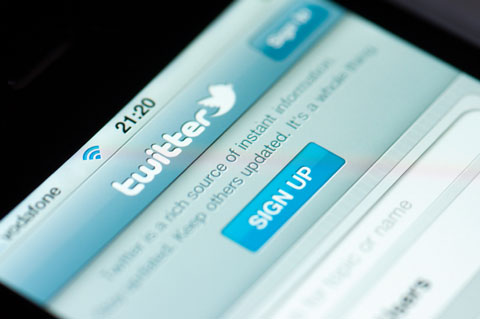
I don't agree. I see a lot of businesses using Twitter to its full potential and cultivating relationships with loyal followers, and those relationships can turn into sales.
Twitter offers businesses of all sizes multiple opportunities to find and convert prospects, but it takes more effort than pushing out scheduled tweets about your products.
It's worth it to invest the time and resources to develop your presence on Twitter. When you do, you'll see more growth and loyalty from customers, as well as more sharing, engagement and leads. Consistent conversations go a long way!
The nine small businesses I showcase below show how attention to community and a little creativity make all the difference in reach and company growth.
#1: Use Twitter to Stand Out
It can be tough to be up against big brands. The hospitality business in New York City is a good example—it's one of the most competitive markets in the industry.
Management at the Roger Smith Hotel, a small boutique hotel in Manhattan, knew they had to find a way to stand out, so they turned to social media marketing.

To get started, hotel management did what a lot of businesses do: They invited key journalists and social media influencers to try out their services. As those influencers took to Twitter to share their experiences, the Roger Smith Hotel got its brand in front of a much larger audience.
The hotel didn't stop there. The team took that boost and ran with it. Now their Twitter feed is lively with trivia, coupons, pictures of New York City and more. They even give discounts to customers who reserve a room via Twitter and the hotel has a Twitter kiosk in the lobby!
Get World-Class Marketing Training — All Year Long!
Are you facing doubt, uncertainty, or overwhelm? The Social Media Marketing Society can help.
Each month, you’ll receive training from trusted marketing experts, covering everything from AI to organic social marketing. When you join, you’ll also get immediate access to:
- A library of 100+ marketing trainings
- A community of like-minded marketers
- Monthly online community meetups
- Relevant news and trends updates
#2: Keep Your Followers Interested
How can a domain registrar and brokerage service like Namecheap attract more than 100,000 Twitter followers? They provide the right mix of business and fun. Trivia and giveaways have always been staples of Namecheap's Twitter feed.
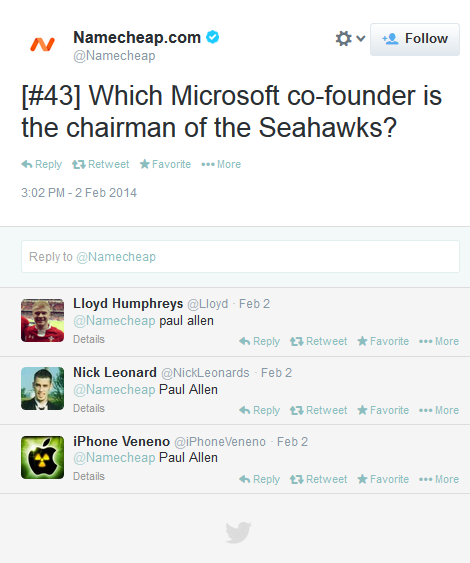
During Super Bowl XLVIII, Namecheap posted 48 interesting questions related to both the big game and information technology. This kept their fans interested and related to the company's niche.
#3: Stick With It
If you're not seeing immediate growth on Twitter, don't give up. As they say, it's not a sprint, it's a marathon. Houston-based coffee shop Coffee Groundz is a great example of this.
Coffee Groundz has the distinction of being one of the first small businesses to set up shop on Twitter. Instead of being discouraged and writing off Twitter as a waste of time with no ROI, Coffee Groundz kept at it. It took a while, but they managed to get thousands of followers thanks to a steady stream of tweets.
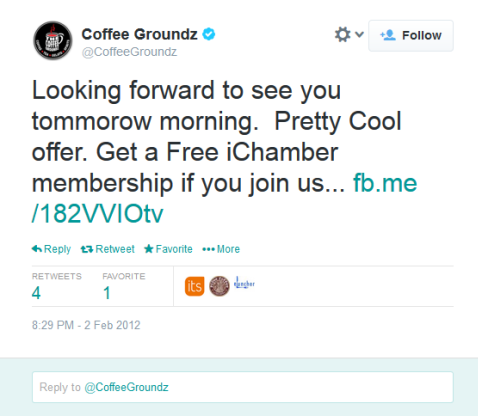
Coffee Groundz tweets special recipes, promotions, pictures of fancy coffee beverages and interesting tidbits of online conversations. Taking the time to show the company's personality and build trust has grown Coffee Groundz' followers to almost 15,000.
#4: Provide a Balance of Work and Fun
Bradbury & Partners is an Atlanta-based executive recruiting firm that focuses solely on the mortgage origination industry. Having such a narrow niche can make it hard to grow a Twitter following, but Bradbury & Partners has found a way.

The firm uses hashtags, sharp commentary and links to questions they tackle on the Q&A social network Quora. To provide a balance of work and fun, they also post niche-related jokes, photos and cartoons.
#5: Keep Your Mobile Users in Mind
Are you ever without your smartphone? Probably not—and neither is your audience. Mobile is the way we both market and consume information. Twitter says it was “born mobile.”

Discover Proven Marketing Strategies and Tips
Want to go even deeper with your marketing? Check out the Social Media Marketing Podcast! Publishing weekly since 2012, the Social Media Marketing Podcast helps you navigate the constantly changing marketing jungle, with expert interviews from marketing pros.
But don’t let the name fool you. This show is about a lot more than just social media marketing. With over 600 episodes and millions of downloads each year, this show has been a trusted source for marketers for well over a decade.
In the past few years, food trucks have become big business. These moving eateries frequently change location (obviously), so it makes sense to tell people where they'll be and when they'll be there. Enter Twitter.
Kogi Korean BBQ, a popular L.A. food truck, owes as much to Twitter as it does to its delicious and ingenious fusion of Mexican and Korean cuisine.
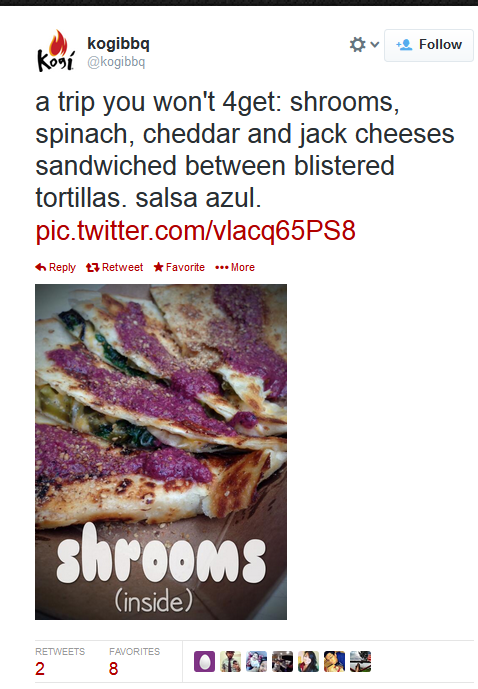
In 2009, Kogi Korean BBQ saw that taco truck fans in Southern California were tweeting menus and locations of their favorite food trucks. They quickly set up a Twitter profile and started updating their customers with schedules, locations and pictures of menu items.
This is still relevant today. Remember to keep your mobile users in mind when using Twitter.
#6: Listen to Your Customers
You may not think of JetBlue as a small business, but within its industry it's a modest carrier compared to Delta or United. Even so, JetBlue was the first airline in the United States to earn accolades for its use of Twitter, a corporate effort that continues to this day.
JetBlue uses Twitter as a customer service platform and has a team in place to monitor and respond to customer questions, compliments, and yes, complaints.
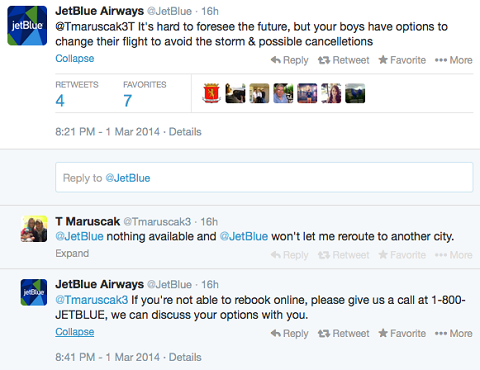
To engage its 1.7 million followers, the company also shares discounts and deals, travel tips and pictures from passengers.
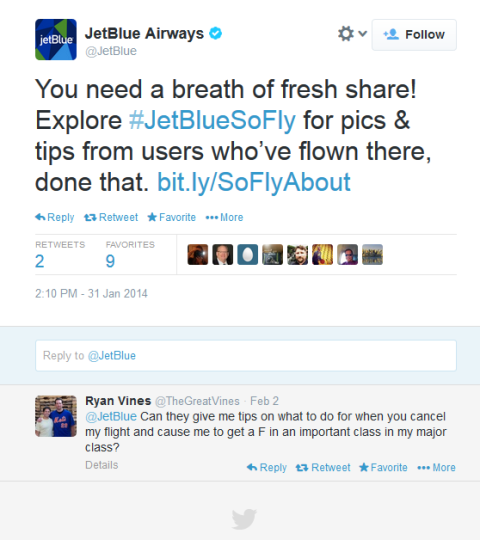
#7: Promote Hard to Find Products
Many small businesses struggle with whether they should be on Twitter. They wonder if it's really the way to reach their customers.
MendezFuel was in the same boat. The owner of the company has four gas stations and needed to set them apart from the bigger chains. How do you make a business like a gas station in South Florida interesting enough for customers to follow on Twitter?

Gas station convenience stores typically carry the same products and those products are generally the same brand. That goes for beer too. As a fan of microbreweries and craft beers, the owner of Mendez Fuel recognized his opportunity.
The microbrewery scene in South Florida isn't as vibrant as in other regions, so it's harder to come by those beers in a convenience store. By offering them in his stores, he knew his followers were likely to come to his gas stations to get their hands on a frosty and unusual craft beer.
Promote your hard to find but popular products to grow a niche following.
#8: Connect With People Who Need What You Have to Offer
Twitter is filled with medical professionals who keep busy with shameless self-promotion. New York City's Dr. Sinkin belongs in a different category. He's a dentist who actually engages his followers.
Dr. Sinkin uses Twitter's search function and third-party services to find conversations related to the dental field. When he runs across a tweet related to dentistry, he engages. For example, if he sees a tweet that indicates someone has a toothache, he introduces himself as a dentist and includes a list of remedies to try.

Twitter is the perfect place to search for people who need what you offer and to surprise them with helpful advice.
#9: Use Twitter for Lead Generation
IdeaPaint sells an amazing paint product that turns walls into dry-erase boards. It's a product that appeals to a range of audiences—businesses, parents, artists, etc.
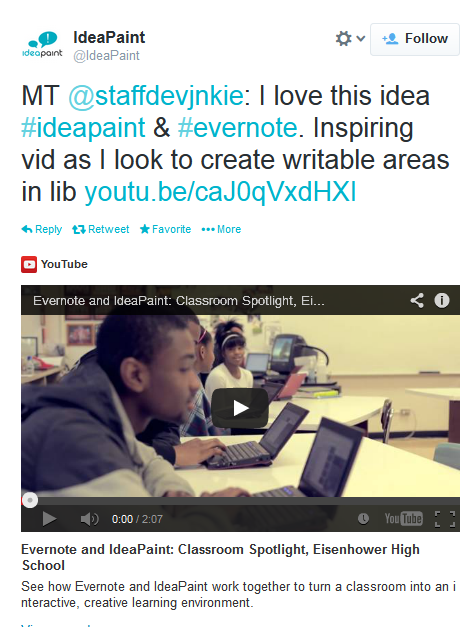
IdeaPaint uses Twitter for lead generation by reinforcing its commitment to generating ideas and supporting creativity. Their stream focuses on the collaborative and imaginative spirit a blank whiteboard presents. Anything is possible: business plans, reminders and all kinds of art. The company's tweets often make mention of the creative process.
Some Final Thoughts…
Twitter isn't just for big companies or spray-and-pray marketing. Any business can find a place on the platform—the key is conversation. Pay attention to your customers and respond to their questions, compliments and concerns. Keep their attention with fun facts, real-time information and local flavor.
What do you think? How are you growing your Twitter follower count? Do you have other examples to share of how small businesses use Twitter? Leave your advice and comments below.
Images from iStockPhoto.
Attention Agency Owners, Brand Marketers, and Consultants

Introducing the Marketing Agency Show–our newest podcast designed to explore the struggles of agency marketers.
Join show host and agency owner, Brooke Sellas, as she interviews agency marketers and digs deep into their biggest challenges. Explore topics like navigating rough economic times, leveraging AI, service diversification, client acquisition, and much more.
Just pull up your favorite podcast app, search for Marketing Agency Show and start listening. Or click the button below for more information.

